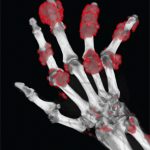Purine metabolism produces serum uric acid (UA). Serum UA levels are associated with multiple lifestyle factors, including intensity of physical activity, drinking alcoholic beverages and smoking. If serum UA levels elevate, the resulting primary hyperuricemia can translate into gout. Hyperuricemia is also associated with metabolic syndrome, hypertension and cardiovascular disease.
Scientists believe that apolipoprotein E (APOE) may play a role in susceptibility to hyperuricemia. The APOE gene is located on the 19q13 chromosomal region and encodes APOE, which plays an important role in transporting cholesterol and other lipoproteins. APOE polymorphism has previously been associated with serum lipid profiles, blood pressure levels, occurrence and development of type 2 diabetes, neurodegenerative disorders and cardiovascular disease.
In a recent study, researchers Jie Wu of Peking Union Medical College & Chinese Academy of Medicine in China and colleagues examined the association between APOE polymorphism and hyperuricemia in China. Their results were published in the October 2014 issue of PLoS One.1
The investigators recruited subjects via the population-based cross-sectional survey, Chinese Physiological Constant and Health Condition, that took place in the Ningxia Hui Autonomous Region. The investigators performed a physical examination of the subjects and then collected fasting blood for biochemical tests. All subjects were instructed to consume a bland diet prior to blood testing. Genomic DNA was extracted from peripheral blood mononuclear cells with the Genomic DNA Purification System. The amplification refractory mutation system–polymerase chain reaction assay was used to determine APOE genotypes.
The investigators compared normouricemic individuals (n = 414) with those who were hyperuricemic (n = 356) and found no difference in mean age (24 years) between the two groups. They then evaluated the frequencies of the APOE genotypes and alleles in the two groups.
The scientists reported that polymorphism in the APOE gene in the Chinese population predicts risk for cardiovascular disease, hypertension, dyslipidemia, diabetes and metabolic syndrome. In addition, Chinese subjects who carry the APOE-ε2 allele and the APOE-ε2ε3 genotype are more likely to have elevated serum UA levels and a higher risk of hyperuricemia than non-carriers. The association remained significant even after adjusting for gender, body mass index, diastolic blood pressure, triglycerides (TG), low-density lipoprotein cholesterol (LDL-C), fasting blood glucose and creatinine. That said, all of these factors were more likely to be present in patients who had hyperuricemia. The investigators found no difference in the ε4 allele between individuals who had hyperuricemia and those with normouricemia.

